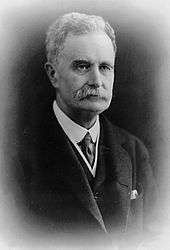Howard Henry Tooth
Howard Henry Tooth CB CMG (1856–1925) was a British neurologist and one of the discoverers of Charcot-Marie-Tooth disease.

Early life and education
Dr. Tooth was born on 22 April 1856 to Frederick Tooth of Hove, Sussex, England. He attended Rugby School and from there attended St John's College, Cambridge. In 1877, he graduated Bachelor of Arts and achieved Master of Arts in 1881.[1]
After his university education, Howard Henry Tooth studied at St Bartholomew's Hospital, achieving his MD in 1885.[2]
Career
He became Physician to the London Metropolitan Hospital in 1887. He was also appointed Assistant Physician in the same year at the National Hospital for the Paralysed and Epileptic and promoted to full Physician in 1907. He was also an assistant Physician at St Bartholomew's Hospital in 1895 and full Physician in 1906.[3]
In 1894 taught a post-graduate course on Cranial Nerves at the National Hospital for the Paralysed and Epileptic.[4]
He was awarded CMG in 1901 and CB in 1918.
Military service
Dr. Tooth spent quite a period of time in the military, resulting in him being awarded the rank of Colonel. During the Boer War, Dr. Tooth was stationed in South Africa.[5]
Over the period of World War I he spent time both in London and as a consulting physician to the troops in Malta and consultant to the British forces in Italy. His services during this time resulted in his name being twice mentioned in dispatches.[2]
Civic participation
Howard Henry Tooth was a member of the Pathological Society of London. In 1894, he served as a council member to that society.
Personal life
Dr. Tooth's first marriage was to Mary Beatrice Price, by whom he had one daughter. With his second wife, Helen Katherine Chilver, he had two sons and one daughter.[5]
He died at home in Hadleigh, Suffolk after a cerebral hemorrhage.
Publications
In 1889 he delivered the Goulstonian Lecture to the Royal College of Physicians on the subject of Secondary Degeneration of the Spinal Cord.
References
- "Tooth, Howard Henry (TT873HH)". A Cambridge Alumni Database. University of Cambridge.
- The British Medical Journal May 23 1925
- Pearce J. M. S. (2000). "Howard Henry Tooth (1856-1925)". Journal of Neurology. 247 (1): 3–4. doi:10.1007/s004150050002. PMID 10701890.
- The British Medical Journal May 12 1894
- J. M. S. Pearce (2000). "Howard Henry Tooth (1856-1925)". Journal of Neurology. 247 (1): 3–4. doi:10.1007/s004150050002. PMID 10701890.